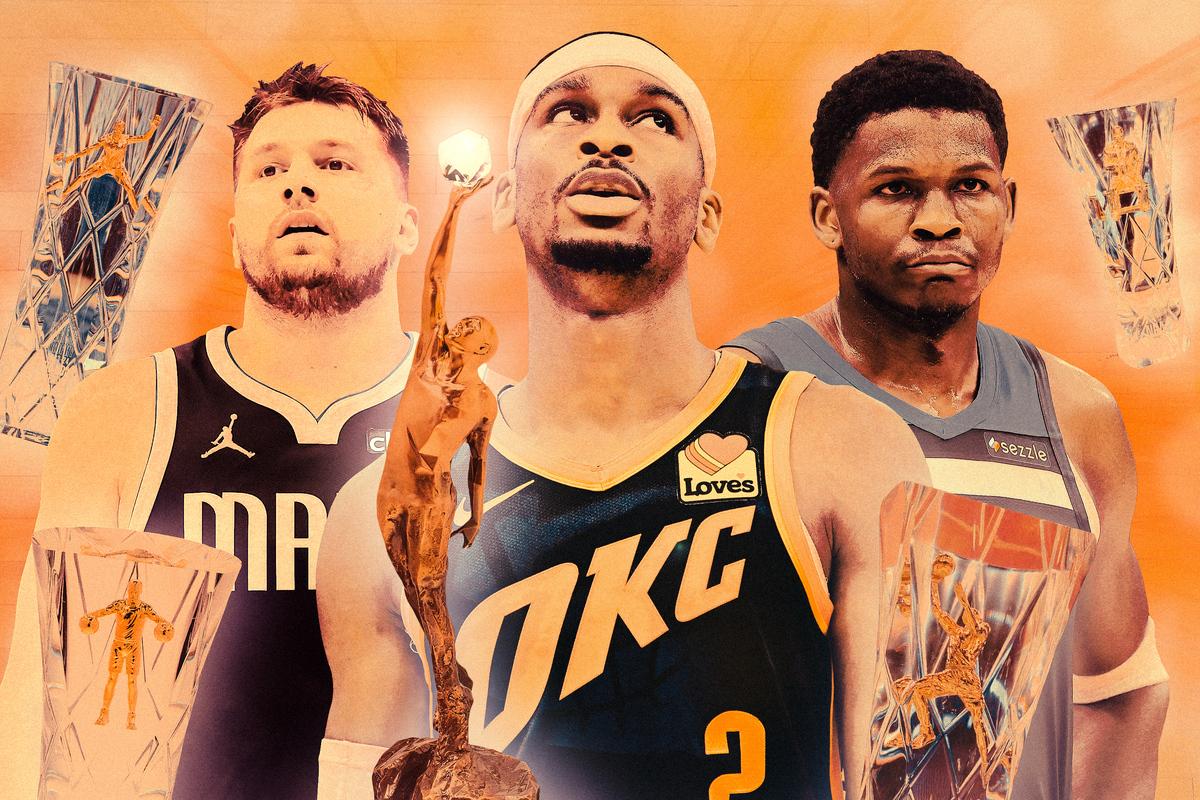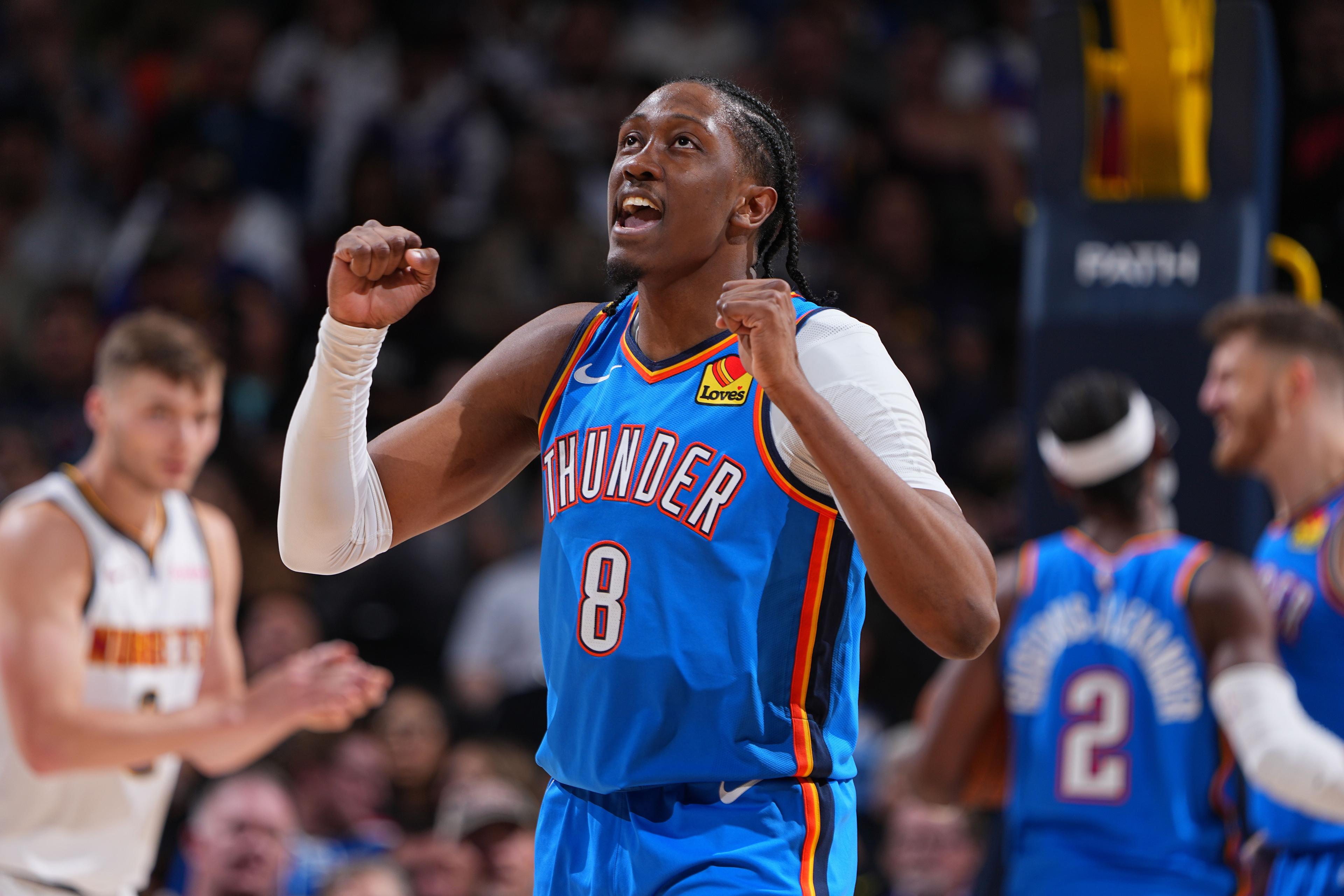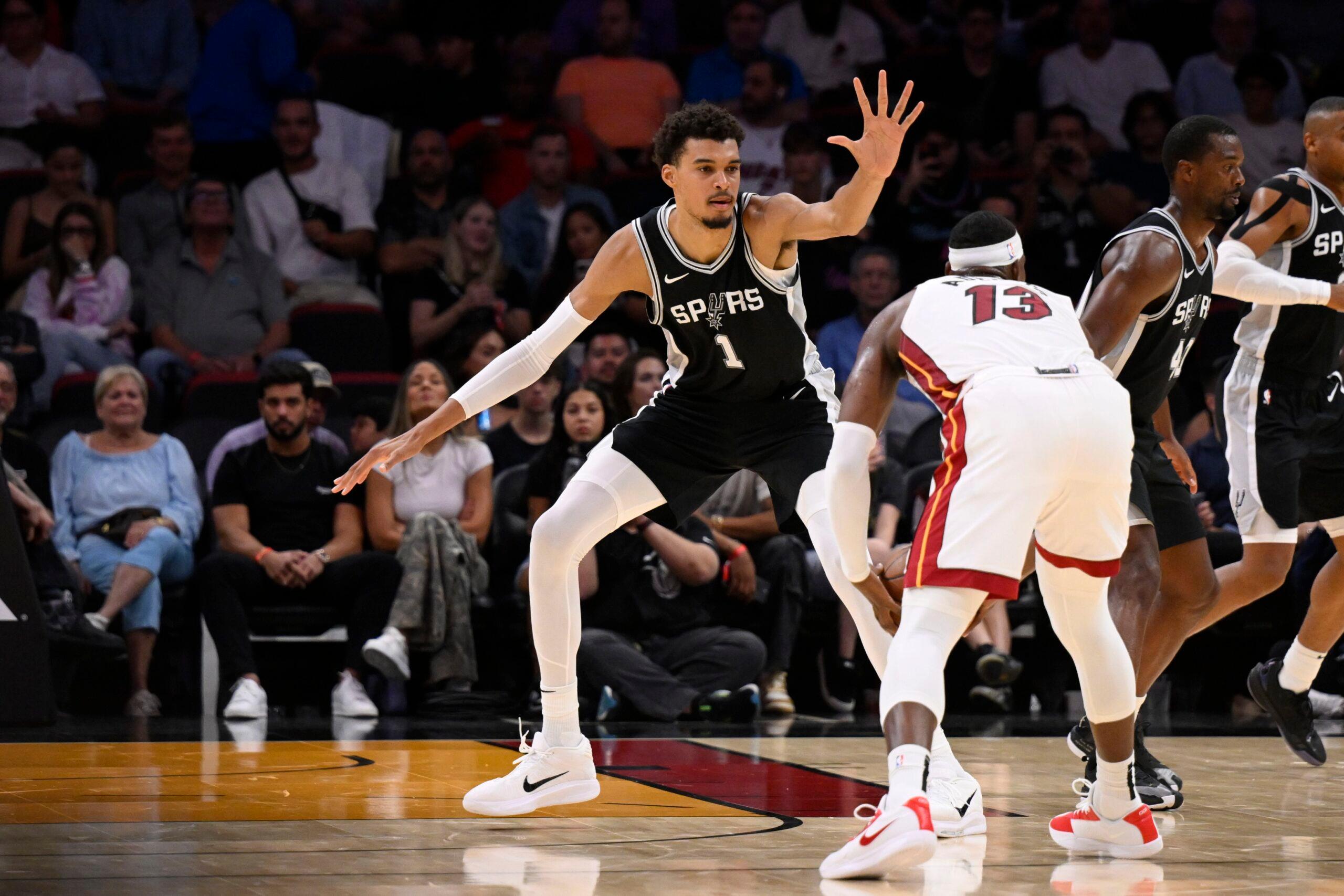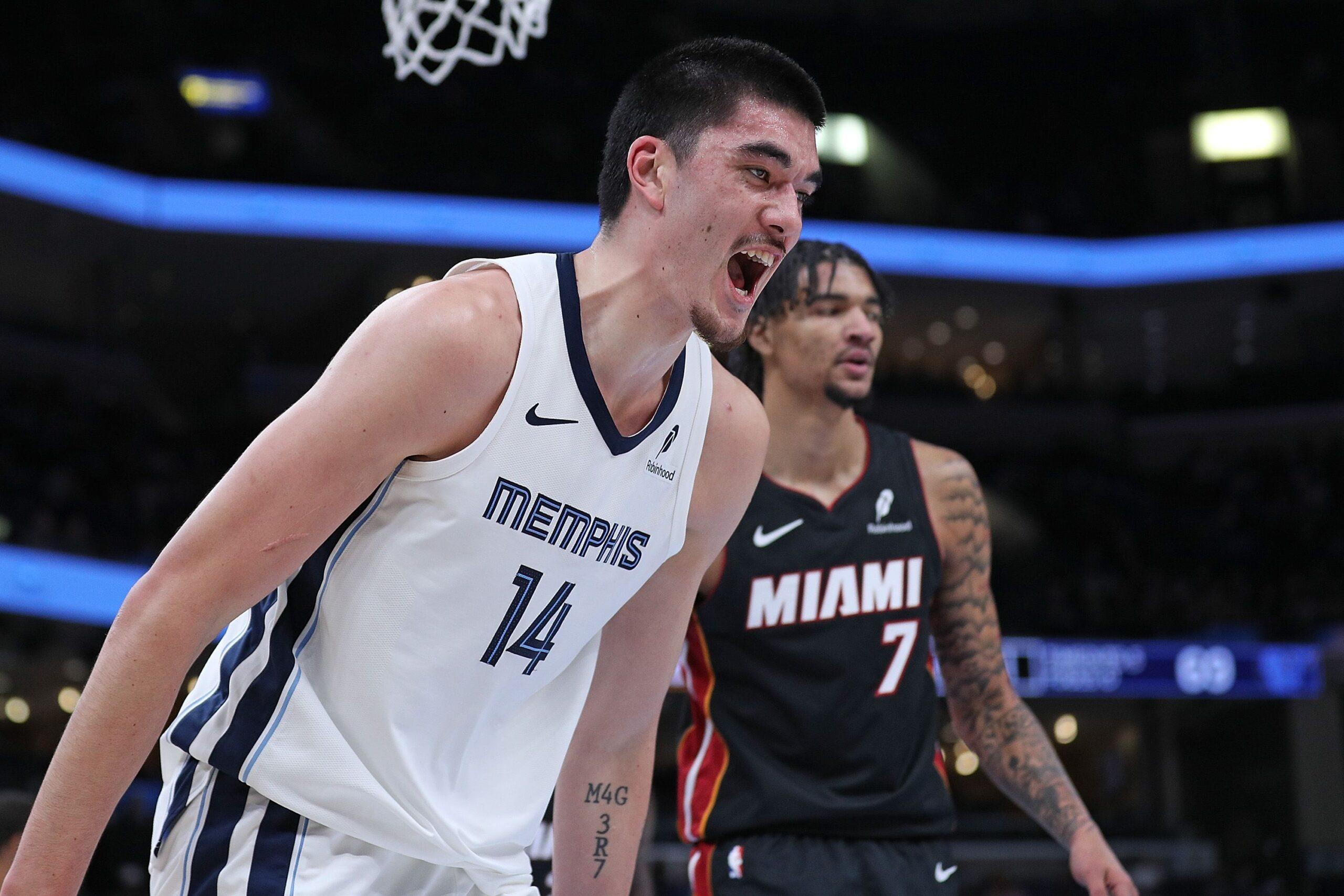
The last six MVP awards have gone to frontcourt players. Can a guard break the streak this season? With the 2024-25 NBA regular season tipping off, the Ringer NBA staff assembled to hand out its official awards predictions. Will this be Luka Doncic’s year to win MVP? Who will win Most Improved Player? And who is the favorite to win Rookie of the Year?
Most Valuable Player
Howard Beck: Luka Doncic, Dallas Mavericks. This feels like Luka’s year. He’s coming off his first Finals appearance, his first scoring title, and his highest MVP finish (third). He’s poised for another monster season statistically. Just as critically, the Mavericks are poised to finally crack the top four in the West—historically, a prerequisite to win the award.
Rob Mahoney: Doncic. Luka has been operating at an MVP level for years, but now the Mavs have the shine of a Finals run and a supporting cast that should put them in prime position for awards contention. Moreover: Every trip down the floor is a reminder of Luka’s influence. Not a possession goes by that isn’t shaped in some way by his virtuosic playmaking, rendering his case in the plainest possible terms.
Justin Verrier: Doncic. He’s gotta win one at some point, right? The numbers are already ludicrous: There have been only 15 instances in NBA history in which a player averaged at least 27 points, eight rebounds, and eight assists in a season, and Luka has five of them. Now, with most of the core from last year’s Finals run back, plus some intriguing new additions (respect Naji Marshall), Doncic has a chance to marry the individual production with top-of-the-West-level team success. Toss in some voter fatigue for Nikola Jokic and a new load-management schedule for Joel Embiid, and this looks like Doncic’s award to lose.
Michael Pina: Anthony Edwards, Minnesota Timberwolves. My brain says Luka, Shai Gilgeous-Alexander, and Jokic are more likely to win. But every other molecule in my body is convinced that the playoff run Edwards led Minnesota on a few months ago was just the prologue to a truly epic fifth season. To actually win MVP, he already checks off a couple of important boxes: His team wins, and he plays a ton of minutes. Beyond that, among every realistic candidate, Ant has the longest runway to show tangible improvement. His stats, efficiency, and decision-making as a playmaker should rise.
Zach Kram: Jokic, Denver Nuggets. Sure, narratively, he’s running into a headwind. But Jokic has three MVP wins and a runner-up finish within the past four years, and it’s not as if his historic all-around individual production has slowed at all. I’ll keep picking him until it does.
Danny Chau: Gilgeous-Alexander, Oklahoma City Thunder. The MVP award typically goes to the undisputed best player on the best team or an absurd statistical anomaly of a season that can’t be ignored. The latter isn’t really in the cards for Gilgeous-Alexander—or is it? There have been only 10 recorded seasons wherein a player has logged an average of at least 30 points and 5.5 assists per game and a true shooting percentage of at least 62. Gilgeous-Alexander is the only one to have done it in consecutive seasons—and should things go to plan in OKC this year, he’ll be the only player to have three such seasons in his career.
Tyler Parker: Gilgeous-Alexander. Damn near picked Luka because he’s an anarchist with the basketball, a glacier-cold headhunter who puts more pressure on the defense than any other player in the league. But speaking of defense, it ain’t that great. Not sure it’s even good. So give me SGA. This is absolutely a homer pick by me, but after what he became last year—a deflection demon that cannot be guarded by one man, a resourceful two-way force who found ways to significantly affect the game on both ends of the floor, someone who can get you a bucket in tight spots against even tighter defense—it feels like things are cresting his way.
Most Improved Player
Mahoney: Jalen Williams, Thunder. Sometimes you just feel the breakout coming. J-Dub has already been a Swiss Army standout, wheeling and dealing within OKC’s offense in a way that brings the entire team to balance. Shai can’t do everything. Chet Holmgren shouldn’t push too far too fast. Enter Williams, a creator so comfortable in his game that you can’t speed him up or throw him off-balance. There’s a steady foundation in J-Dub’s game; he’s ready to do more.
Kram: Williams. The past five winners of this award were all first-time All-Stars, and other than Victor Wembanyama (who’s entering his second season, and a second-year player hasn’t won MIP since Monta Ellis in 2006-07), J-Dub is the most likely first-time All-Star this season. (On our Top 100 player ranking, the only non-All-Stars ranked higher than Williams are Wemby and the slumping Jamal Murray.)

Chau: Shaedon Sharpe, Portland Trail Blazers. The third-year wing will miss roughly the first month of the season with a shoulder injury, but Sharpe has as clear a pathway to stardom as any player on the team. A five-game stretch from late November into early December last season offered a glimpse: per-game averages of 26.2 points on 52.9/46.5/80.8 splits, 6.6 rebounds, and five assists. On a team with a no. 3 pick, a former Rookie and Sixth Man of the Year, a starting center in an NBA Finals, and a wing who has made more than $109 million in his career, it was the 20-year-old Sharpe who looked like the alpha and omega. Perhaps a sign of things to come?
Pina: Devin Vassell, San Antonio Spurs. San Antonio’s turn to normalcy (i.e., the decision to sign Chris Paul and trade for Harrison Barnes) will be instrumental for Wembanyama’s development. It should also serve Vassell, a pointy arrow who has every physical tool required to thrive in the exact role San Antonio needs him to fill. He has 3-point range, makes deft reads out of a pick-and-roll, and can function at a high level off the ball. Assuming that his foot properly heals sooner rather than later, Vassell’s fifth season could be the one where he flirts with an All-Star appearance and solidifies himself as Wemby’s long-term right-hand man.
Verrier: Josh Giddey, Chicago Bulls. The playoff benching was … not great. But the Bulls are giving the former no. 6 pick a chance to be his best self. Giddey’s iffy shooting was exposed when he was playing off Gilgeous-Alexander in OKC, but Chicago has enough cutters and shooters (stop laughing) to highlight his elite vision and inventive passing. Giddey also has great size, which will help on the boards and aid the Bulls’ lineup versatility. Near triple-double averages are well within range.
Beck: Immanuel Quickley, Toronto Raptors. Quickley made several leaps during his Knicks tenure—from late first-round pick to critical rotation player to Sixth Man of the Year runner-up. He could make another this season in Toronto, where he’s now entrenched as a go-to scorer next to Scottie Barnes. In 38 games after being traded last season, Quickley averaged 18.6 points and 6.8 assists, both of which were career highs. The rebuilding Raptors will give him all the room he needs to keep expanding his game. And the franchise clearly expects great things, having signed him to a five-year, $175 million contract this summer.
Parker: Coby White, Chicago Bulls. A massive part of me wanted to pick either Bam Adebayo or Tyrese Maxey. Maxey’s an offensive scatback who seems primed for a monstrous year. Adebayo, if the preseason is to be believed, has now incorporated the 3-ball into an offensive package that used to cap out around 17 feet. But I’ll take White, a player who put the Bulls on his back for stretches last season and a guy I suspect will play with even more confidence this go-round. The production will be upped, along with offensive responsibilities. He’s a total party on that end of the floor and knows well how to live más. Deep 3s off the bounce, jittery stepbacks, contested moonrakers. Watch and be entertained.
Defensive Player of the Year
Kram: Wembanyama, San Antonio Spurs. How many years in a row will Wemby be the obvious preseason pick for this award? Barring injury, his run should extend at least through the rest of the 2020s, right?
Mahoney: Wembanyama. I didn’t think a player this young could ever win the league’s top defensive honor, and I was wrong. Wemby is undeniable.
Beck: Wembanyama. We’re no longer wondering, “Will Wembanyama win Defensive Player of the Year?” The questions are “How soon?” and “How many?” and “Will anyone else even have a shot in the next 10 years?”
Chau: Wembanyama. He was a clear runner-up in last season’s DPOY race as a rookie. Just about every game he played in the Paris Olympics had at least one moment when viewers were in utter disbelief about how he could manipulate his physical dimensions to stymie an offensive possession. And we’re still just at the start of his career. I’m so sorry, Adebayo, but as long as Wemby is upright, the Hakeem Olajuwon Trophy may continue to elude you.
Verrier: Wembanyama. All due respect to other game-changing defenders like Rudy Gobert and Herb Jones, but no other player can literally warp the geometry of the court. Wemby probably should’ve won this award last season, too.
Pina: Wembanyama. In the same way that there are several contenders for the title “Master of Horror” but only one John Carpenter, there are several candidates for “Best Defender in the NBA” but only one Wembanyama.
Parker: Wembanyama. Perimeter defenders get the short straw in these discussions and deserve more recognition, considering they’re often tasked with being the primary defenders against the most explosive scorers in the league. Guys like Jrue Holiday, Jones, Derrick White, OG Anunoby, Lu Dort, Alex Caruso, and Jaden McDaniels always seem to wind up on the outside of these discussions. But … give me the French Monstre. Wembanyama showed last year that he was a different kind of storm for offenses to work through. He contests shots all over the court, has serious ranginess, and seems to scare the hell out of just about every player who steps foot inside his paint. Guys enter, see his all-encompassing visage, and put the car in reverse.

Sixth Man of the Year
Verrier: Miles McBride, New York Knicks. This is a ridiculous honor that rewards good scorers who aren’t good enough to start. Having said that, McBride may be the Knicks’ only reliable bench option, so he will probably play the kind of minutes and put up the kind of points that typically win you this award. Congrats, Miles.
Chau: Donte DiVincenzo, Minnesota Timberwolves. On a Timberwolves team in desperate need of creators beyond Edwards, DiVincenzo has arrived at a perfect time. The past two seasons in Golden State and New York have solidified his bona fides as an elite 3-point shooter, but with free rein as a supersub, DiVincenzo will finally be given the opportunity to leverage all his tools as both a pick-and-roll handler and havoc creator coming off screens. A Manu Ginobili for our troubled times.
Pina: Caruso, Thunder. Sixth Man of the Year is not called “Best Scorer Off the Bench,” yet it always favors offensive production. Why? Only three players in the award’s history have averaged fewer than 10 points per game, and the last one to do it was Anthony Mason almost 30 years ago. If Oklahoma City’s starting five—currently unknown, potentially fluid—features Isaiah Hartenstein instead of Caruso, the former Bulls standout will finish below the 10-point barrier, and, well, so what? There’s a very good chance that no one will wreak more havoc than him in a defensive system that could not more perfectly emphasize his aggressive instincts and complete versatility.
Parker: Naz Reid, Timberwolves. So many fun options this year. Amen Thompson is a year older, Russell Westbrook will be playing off Jokic, Hartenstein should be a hub in OKC, Deuce McBride will be getting more minutes now that the Big Ragu’s in Minnesota. But give me Reid. You see, you’re not Naz Reid unless you live Naz Reid, and the legend of the Wolves was always Naz Reid.
Mahoney: Caruso. Inexplicably, the NBA voting body never honored Warriors-era Andre Iguodala—the best and most vital bench player by miles—as the Sixth Man of the Year. But it’s never too late for voters to acknowledge the fact that defense exists and that one of the very best defenders in the league will be coming off the bench for one of its most self-evident contenders.
Kram: Malik Monk, Sacramento Kings. He probably would’ve won last year if he hadn’t gotten injured with two weeks to go, and Reid and DiVincenzo may split the Timberwolves vote this season. I also have faith that Monk will remain a sixth man throughout the season—whereas other contenders might force their way into starting lineups—because Sacramento has De’Aaron Fox, DeMar DeRozan, and Domantas Sabonis, so it makes sense to keep Monk in reserve for some scoring juice off the bench.
Beck: Monk. I’m tempted to go with DiVincenzo, whose sharpshooting and all-around tenacity will supercharge the Timberwolves bench. But he’ll be splitting votes with his own teammate—reigning Sixth Man of the Year Reid. So let’s go with Monk, who finished second in the 6MOY balloting last spring and was rewarded with a four-year, $78 million contract. Even with DeRozan arriving to boost the offense, the Kings will lean heavily on Monk to lead the second unit and generally make Fox’s life easier.
Rookie of the Year
Mahoney: Zach Edey, Memphis Grizzlies. Call it reductive, but I’ll take the rookie who will get consistent minutes and might be kind of unguardable for a team that should actually be good. The Grizzlies very much need Edey to be a factor, but more than that: They need him to be a factor right now. He’s going to be involved and, if the preseason is any indication, even featured. And if Edey is involved, he’ll put up the kinds of numbers that can help him run away with this award—he’ll be a 7-foot-4 standard-bearer for a relevant team.
Beck: Edey. He might not stuff the box score on a stacked Grizzlies team, but he will get ample opportunities to shine alongside Ja Morant, Desmond Bane, and Jaren Jackson Jr.—and the added boost of playing for a likely playoff team, which will set him apart from most of his fellow rookies.
Chau: Reed Sheppard, Houston Rockets. A consolidation is coming in Houston, and Sheppard’s seamless transition to the NBA game as an elite shooter with playmaking poise (and disruptive off-ball defensive instincts) could clarify some things for one of the biggest wild cards in the West. In a season when there might not be a dominant rookie campaign to rule them all, Sheppard’s clear-cut, projectable impact seems like a good bet.
Verrier: Sheppard. Respect the ’stache. Sheppard makes plays—and not only from the perimeter. He has great feel and vision with the ball and active hands on defense that will spark two or three fast breaks a game. He’s just a good basketball player. So while he might have trouble aggregating gaudy counting stats if he’s coming off the bench all season, I think that the Rockets will end up playing Shepphard more than even they think—and maybe even making some trades to clear a path for him.
Parker: Sheppard. Like JV said, the mustachio is strong with this one. It’s exciting to see someone elevate their postcollegiate look so immediately. I think it gives a sense of, not exactly danger, but at the very least a high-quality latchkey kid kind of vibe. The shot is special and the awareness is aces and the defense is grimy. He’s an instinctive playmaker and competitive as hell. If he gets enough minutes to show what he can do, the trophy should be his.
Pina: Edey. No rookie will have a more prominent role (starting center!) on a team with legitimate championship aspirations. Edey has a chance to impact winning at a high level while submitting impressive counting stats. He’ll catch lobs. He’ll crash the offensive glass. He’ll spark fast breaks. He’ll feast on scraps without ever being in a spot he can’t handle. It’s a fantastic, mutually beneficial situation for the 7-foot-4 big man.
Kram: Edey. I’m not sure Edey will be the best rookie, but I think he offers the best blend of opportunity and production. Sheppard might not get enough playing time on a loaded Rockets squad, for instance, while the likes of Alex Sarr will probably play a lot but struggle a lot, too. Edey, though, should fill up the box score on a solid team, which makes him the favorite in a relatively weak class.

Coach of the Year
Parker: Tom Thibodeau, Knicks. It’s to the point where I almost want to pick Erik Spoelstra for this every year, but I’m not sure the Heat will have enough wins to get him there this time around. Mark Daigneault is a sorcerer and the best squinter in the league, but he just won it last season, and the Thunder don’t get to sneak up on people’s too-low expectations this time. Mike Budenholzer is a strong, strong option because you have the comeback factor. But gimme Thibs. He’s holding on to his hair for too long, and when he screams, he sounds like someone stuck Chali 2na in a garbage disposal. But the man coaches hard, has the Knicks playing like elite scrappers, and remains one of the best defensive minds in the league. The Knicks should win enough games for him to get his hardware.
Mahoney: Joe Mazzulla, Boston Celtics. Mazzulla could be the rare coach to earn this award while his team wins fewer games than in the season prior. The task ahead for Boston isn’t stacking wins into the mid-60s; it’s mounting a proper title defense and duct-taping together a rotation that can get the Celtics through the year in one piece. If the no. 1 seed in the East leans heavily on Luke Kornet and Xavier Tillman, it will be because of great coaching. If Boston keeps engaged without running itself into the ground, that’s great coaching. We’ve seen Mazzulla do it at the highest levels of competition (“it” being both pulling out all the stops to win and sounding like a cult leader in the process). Putting this team in a position to defend that title could prove even tougher—and more impressive—than winning it in the first place.
Kram: Budenholzer, Phoenix Suns. Between Budenholzer’s arrival, better health, better luck, and an improved roster with fewer glaring weaknesses, the Suns should improve this season, and Bud will reap the rewards if Phoenix pushes toward the top of the Western standings. He has a history of doing so, with Coach of the Year trophies from his second season in Atlanta and his first in Milwaukee.
Chau: Jamahl Mosley, Orlando Magic. Mosley deserves all the credit in the world for getting one of the youngest teams in the league to buy into a structural ethic that produced a top-three defense last season. Orlando is still young, and it’s still too long and too athletic for most teams to handle. Continuity accounts for a whole lot in the regular season, and it wouldn’t be too much of a shock if Orlando finds itself solidly in the Eastern Conference’s top three. After years of mining for talent, the Magic have found their core. But maybe most importantly, they’ve found a coach that has finally made it all make sense.
Pina: Mazzulla. Expectations are a COY killer. And even though they won’t have Kristaps Porzingis for the first few months of the season, the Celtics are expected to win a ton of games, be elite on both ends of the court, and defend their title with the disposition of a wounded, fuming lion. If the Celtics hit those marks, stay motivated, and refuse to loosen their headlock on everyone who steps in their path, it’ll be hard not to reward Mazzulla, a battle-tested champion who’s already proved to be as shrewd and bold as anyone in his field.
Beck: Kenny Atkinson, Cleveland Cavaliers. Most years, this award goes to a coach whose team wildly exceeded expectations, making a leap either from lottery to playoffs or from lower seed to surprise contender. That might not happen this season—the tiers seem pretty clear-cut in both conferences. But Atkinson, who’s studied under Mike D’Antoni and Steve Kerr, could finally unlock the Cavaliers offense and put Cleveland in position to compete with New York, Philadelphia, and Milwaukee for one of the top spots in the East.
Verrier: Erik Spoelstra, Miami Heat. Spo probably won’t win—this award tends to honor the best team, not the best coach—but he’s the most creative coach in the game who, season after season, makes chicken salad out of awkward rosters. It’s criminal that he doesn’t have an Auerbach yet.
One Made-Up Award
Parker: The White Guy That Looks Most Like He Cliff Jumps Into Lakes: Sheppard*. Strong competition this year, with Sheppard getting the nod over Gradey Dick, Austin Reaves, T.J. McConnell, Payton Pritchard, Joe Ingles, Steven Adams, and Jeff Van Gundy.
(*He’s hitting a gainer almost certainly.)
Beck: The Pass Me the Tissues Award. Inside the NBA, barring the unforeseen, will spend the season unofficially counting down to its final show. Even TNT’s new ad—featuring Ernie, Chuck, Shaq, and Kenny as museum statues, posed in their most memorable moments—looks, feels, and sounds like a memorial. I miss them already.
Pina: The Most Likely to Get Traded Award. D’Angelo Russell, come on down! Regardless of how well he plays before February 8, it’s hard to envision a universe where Rob Pelinka doesn’t do whatever he can to get someone who’s more capable of positively contributing in a playoff setting than Russell. If that means attaching two first-round picks, so be it. If the Lakers are serious about competing for a championship, as new head coach JJ Redick has publicly said, then keeping DLo onboard would qualify as something akin to malpractice.
Mahoney: New Year, New Me (Same Me, Though) Award to LaMelo and Lonzo Ball (tie). If ball is life, then this season we live twice—thanks to the dual returns of the princes of Chino Hills. LaMelo is back in action for the Hornets after missing 60 games last season, to conjure passing lanes out of thin air and run the point as if it were performance art. But even more notable: Lonzo, the eldest of the Ball brothers, takes the NBA court for the first time since January of 2022, finally putting a string of injury complications behind him. It’s been a long way back for Lonzo, who is already one of this season’s best stories. Here’s hoping that’s a good omen—for a successful comeback season for the Bulls guard and an end to his brother’s own start-and-stop injuries in Charlotte.
Verrier: Can Comeback Player of the Year make a comeback? Because if Lonzo Ball plays even a reasonable number of games after missing nearly three seasons of basketball, he deserves some kind of recognition.
Kram: Milestone of the Year. With 253 more 3-pointers, Steph Curry will reach 4,000 for his career—a ludicrous accomplishment given that no other player in NBA history has even reached 3,000. (James Harden should get there this season.) Steph has surpassed 253 3s in each of the past four seasons, so barring an extended injury, expect him to arrive at this next big, round number sometime around the All-Star break.
Chau: Most Shameless Tankers of the Year. By this point, we know that being the abjectly worst team in the league doesn’t necessarily warrant either brownie points or positive karma in the pursuit of any top-tier prospect. The odds are the odds. But still, there’s something to making a statement of intent and [cough] planting a Flagg. The Wizards are a hodgepodge band of chuckers, raw talent, and the kind of veterans that usually get moved by the trade deadline. It’ll get messy; it’ll get ugly. For a rebuild of this caliber, it’s supposed to. You don’t find the clarity of a Cooper Flagg or Ace Bailey without spending a whole lot of time in the mud.


